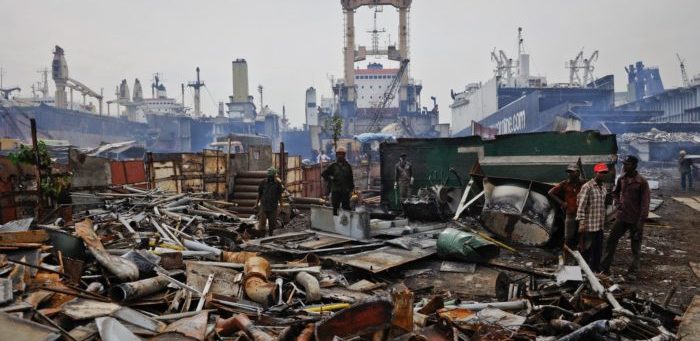The NGO Shipbreaking Platform has issued its list of ships dismantled worldwide in 2016 revealing an increase in the number of ships sold for polluting and unsafe shipbreaking on the beaches of South Asia. In 2016, a total of 668 vessels were broken on tidal beaches, that is as much as 87% of all tonnage dismantled globally, NGO says.
 The NGO Shipbreaking Platform notes that its list which includes all ships dismantled around the world in 2016, shows no improvements of the shipping industry’s management of its end-of-life vessels.
The NGO Shipbreaking Platform notes that its list which includes all ships dismantled around the world in 2016, shows no improvements of the shipping industry’s management of its end-of-life vessels.
Furthermore, the Platform released data that indicate an increase in the number of ships sold for polluting and unsafe shipbreaking on the beaches of South Asia. In 2016, a total of 668 vessels were broken on tidal beaches, that is as much as 87% of all tonnage dismantled globally.
“The shipping industry is nowhere close to ensuring sustainable ship recycling practices. Last year, we saw not only an increase in the market share for dangerous and dirty shipbreaking, but also a record-breaking number of EU-owned vessels on the South Asian beaches. A jaw-dropping 84% of all European end-of-life ships ended up in either India, Pakistan or Bangladesh. Beaching yards are not only well known for their failure to respect international environmental protection standards, but also for their disrespect of fundamental labour rights and international waste trade law,” says Patrizia Heidegger, Executive Director of the Platform.
A higher number of ships beached means that workers, the environment and local communities in South Asia are exposed to ever increased hardship. 2016 saw the worst catastrophe in the history of the industry: on 1 November, at least 28 workers were killed instantly and more than 50 injured when an explosion and a massive fire shook a tanker beached in Gadani, Pakistan. The death toll in the Bangladeshi yards, which the Platform was able to document, reached 22 in 2016, with another 29 workers having suffered serious injuries. Whilst accident records in Indian shipbreaking yards are kept a secret, the Platform was informed of at least two fatal deaths in Alang.
The data compiled by the Platform also show that ship owners continue to shield themselves from responsibility through the use of cash buyers such as GMS and Wirana. These scrap dealers reflag end-of-life vessels to last-voyage flags of convenience, such as Palau, Comoros and St Kitts and Nevis, and sell them off for the highest price offered by the worst yards.
“Looking at the flags used at end-of-life, it is clear that legislation based on flag state jurisdiction will not be able to bring substantial change to the current practices: who believes that a non-compliant flag and a cash buyer benefitting from the worst conditions will enforce improvements in shipbreaking yards?,” says Ingvild Jenssen, Policy Director and founder of the Platform. “The global shipbreaking crisis can only be solved through measures that go beyond flag state jurisdiction. That is why we call on the EU to demand a ship recycling licence from all vessels visiting EU ports.”
In 2017, the EU will publish a list of ship recycling facilities around the world that comply with high standards for environmental protection and workers’ safety. The list will be the first of its kind and an important reference point for sustainable ship recycling. German container line Hapag-Lloyd has already committed its end-of-life ships off the beach, and has announced that it will only use EU listed facilities.
The European Commission has already adopted the first version of the “European List of ship recycling facilities”, taking an important first step to help ensure that ships are recycled in facilities that are safe for workers and environmentally sound. The inclusion of yards from third countries is as important and the Commission is currently assessing applications on whether they meet the necessary strict requirements to be included in 2017.
A financial incentive affecting ships trading with the EU is however needed to ensure that irresponsible ship owners are directed towards the facilities listed as approved by the EU. A proposed Ship Recycling Licence scheme is now being discussed. The many scandals involving European shipping companies are also a driver behind the strong interest that various financial institutions have started to show in ship recycling: to ensure responsible business practices some are now setting criteria for shipping companies they finance while looking at the EU Ship Recycling Regulation for guidance.
Further details may be found in the report herebelow
The NGO Shipbreaking Platform also issued a list of all ships dismantled worldwide in 2016
Source & Image credit: NGO Shipbreaking Platform






























































